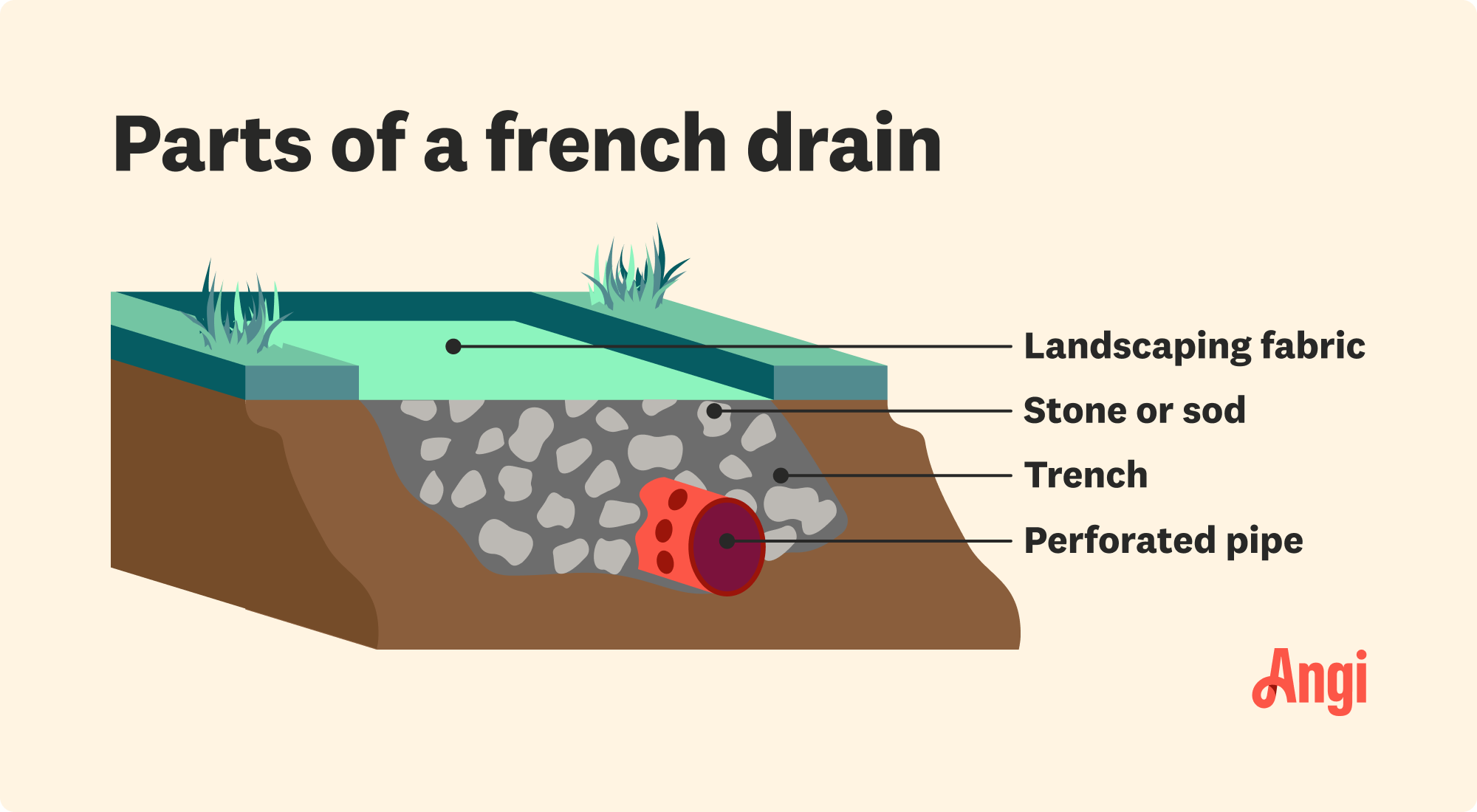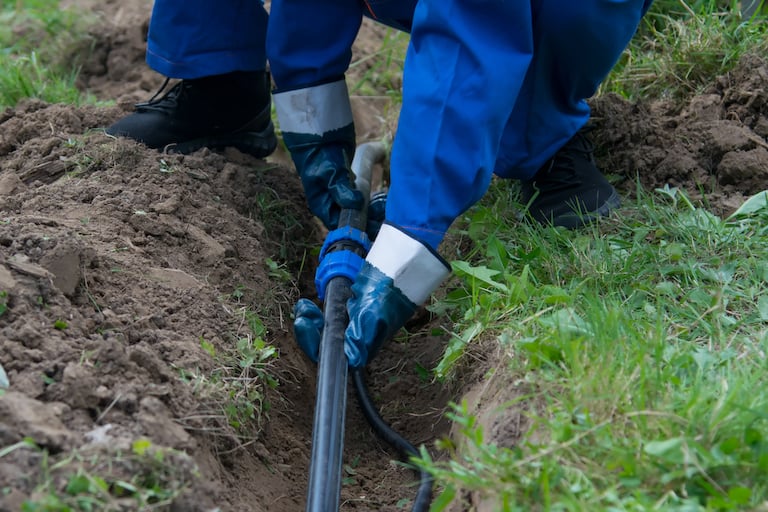
Discover the average outdoor misting system cost, key price factors, and ways to save. Get transparent, expert-backed estimates for your installation.
This type of drain may be the solution to your waterlogged lawn


A French drain is designed to redirect water away from your home and property.
You should hire a professional to install a French drain correctly due to its complex and labor-intensive nature.
A French drain can prevent pooling water and damage to your property.
French drains can last 30 to 40 years, with proper maintenance.
If you have pooling water around your foundation or yard, you may want to consider installing a French drain. But what is a French drain exactly, and how does it work? This efficient drainage system is commonly used by homeowners who need to divert water away from houses or lawns to prevent flooding and damage to their property. Let’s dive into the details you need to know about French drains so you can decide if it’s the best drainage system for your yard.
A french drain provides a sunken channel for water to disperse into the soil surrounding your home. Installing this type of system requires digging a trench and hooking up pipe connections, among other tasks, so it's best to hire a professional french drain installation company for this project.

A French drain is a drainage system used to redirect water away from a specific area, such as a home’s foundation or lawn. It consists of a trench lined with filter fabric, a pipe, and rocks. The rocks allow the water to percolate into the ground, collect in the pipe, and disperse to another location known as the exit point.
French drains are dug on a sloped angle, which allows gravity to let the water flow freely and drain effectively. This outlet can be designed to disperse water in many different locations, such as a municipal drain, a rain barrel, a rain garden, a dry creek bed, or a catch basin. This stops water from accumulating and flooding the area which prevents damage to the foundation of a home or lawn.
| Pros of French Drains | Cons of French Drains |
|---|---|
| Efficient drainage | Improper installation can cause serious issues |
| Versatile for many yard types and drainage issues | Expensive to install |
| Prevents mildew and mold growth | May need permit to install |
While a French drain may be the solution to your soggy lawn, there are some pros and cons to consider before you start digging or hiring a pro. Let’s look at the perks of a French drain before we explore the disadvantages.
Efficient drainage: A French drain is excellent for preventing pooling water and redirecting water away from your home or yard.
Versatile: They can be installed in various locations, such as around the foundation of your house, patios, retaining walls, and other areas of your lawn.
Prevents mildew and mold growth: The drain prevents standing water from collecting near your home, which can be a habitat for mold and mildew.
Improper installation can cause issues: Installing a French drain improperly can prevent it from working correctly and lead to flooding and damage to your property.
Cost: A French drain can get costly depending on the size and complexity of the system. Installing a yard drainage system ranges between $2,200 to $6,800. Installing a French drain costs between $500 to $18,000.
Need permits to install: Another potential drawback of French drains is that large, complex yard systems require a permit to install. Building permits cost between $50 to $500 for plumbing-related permits, or $20 to $500 for outdoor permits.
So, how do you know that your yard needs a French drain? Well, there are some tell-tale signs to watch out for that will help you determine if you should install a French drain. Here are some common signs your yard isn’t draining adequately:
Pooling water: Standing water in your yard or around the foundation of your home is a sign of poor drainage.
Soggy lawn: A squishy waterlogged yard can be a sign that it is not draining properly and that you should install a French drain.
Water in basement or crawl space: If you have water seeping into your crawl space or basement it can also be a sign that there is a drainage problem.
Soil erosion: Eroding soil in low-lying areas of your lawn or around your home can be caused by poor drainage as well.
If you are showing any of these signs then you should contact a French drain installation company near you to help determine if you should have one installed.
Another common drainage system is a trench drain. But what is the difference between a French drain and a trench drain, and which should you use?
A trench drain is designed to divert surface water runoff. It is a long, narrow drain usually installed in the ground and covered with a grate to prevent debris from clogging it. Depending on their purpose, trench drains are made with various materials, such as polymer concrete, steel, and fiberglass. They are commonly installed in paved areas such as driveways, walkways, and parking lots.
On the other hand, a French drain manages subsurface water flow and redirects it away from an area. So, which one you should install depends on your specific needs. It’s best to consult with a French drain professional to determine which drain will be the most beneficial for your property.

In most cases, it’s best to hire a professional to install a French drain. While you may be able to install a simple French drain system yourself, you should seek the advice of a pro for complex drainage systems. If you do not install the drain properly, it can lead to a slew of problems and damage your foundation and yard.
Although hiring a pro may be more costly upfront, it can save you money later by avoiding property damage if you install it incorrectly. Plus, you can rest easy knowing the drain will be properly installed and that it will work efficiently.
From average costs to expert advice, get all the answers you need to get your job done.

Discover the average outdoor misting system cost, key price factors, and ways to save. Get transparent, expert-backed estimates for your installation.

If your sprinkler system isn’t working, it may be time for a new pump. Find out sprinkler pump replacement costs with this guide.

Discover yard drainage cost estimates, including average prices, key cost factors, and tips to help you budget for your yard drainage project.

A pressure vacuum breaker keeps your drinking water clean. So how can you tell if a vacuum breaker is bad? Review this guide for what to know about PVBs.

Have you ever wondered, “How does a sprinkler valve work?” Dive into the details of this important component of your sprinkler system.

Looking for pointers on how to design a sprinkler system? Use this guide to navigate the process and create the DIY sprinkler system of your dreams.